
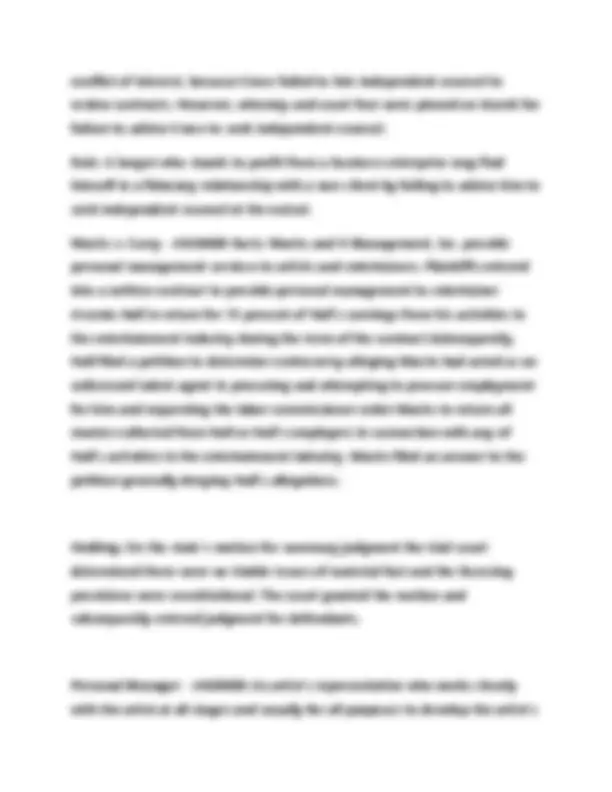
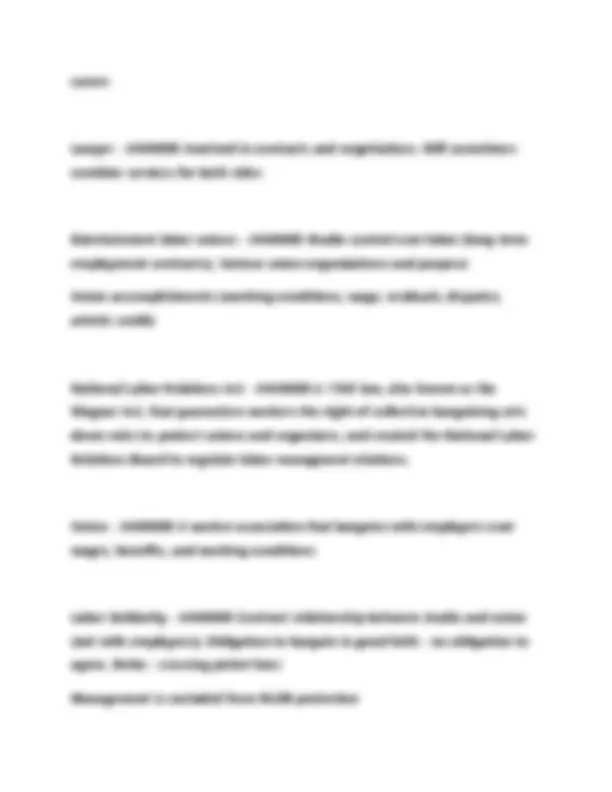
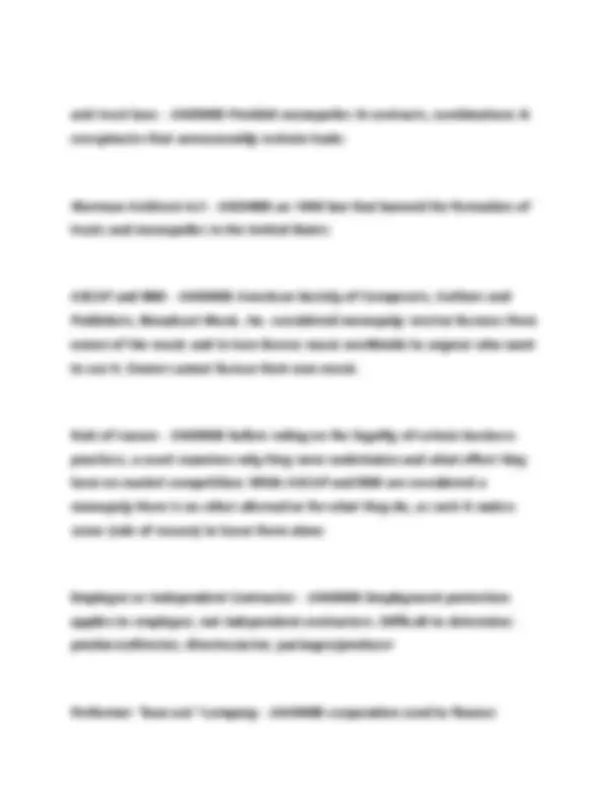
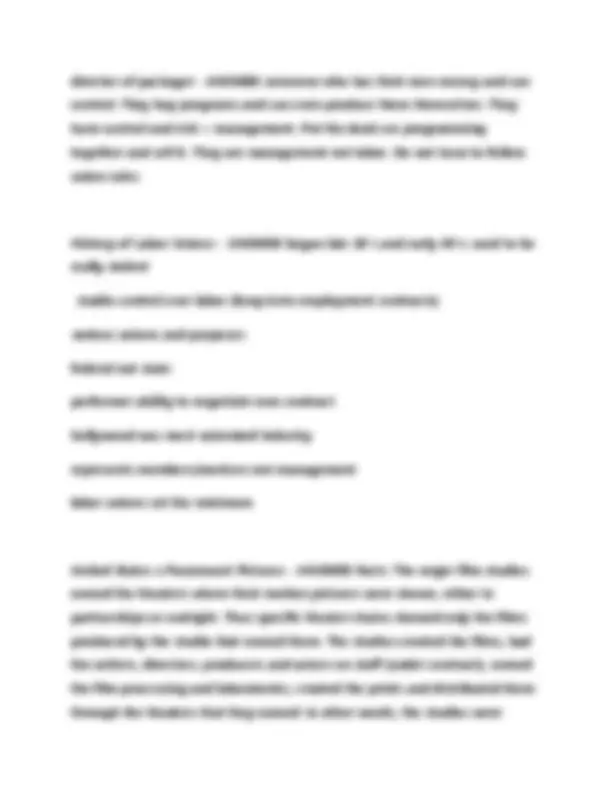
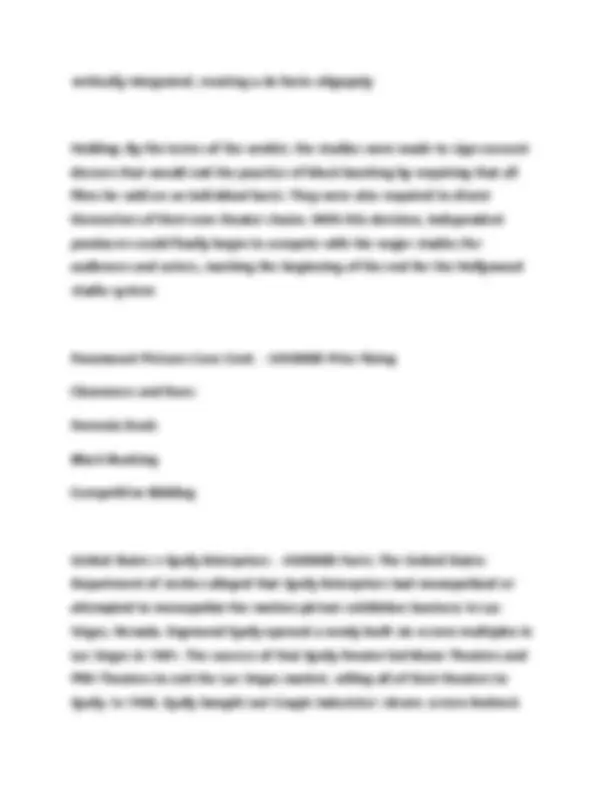
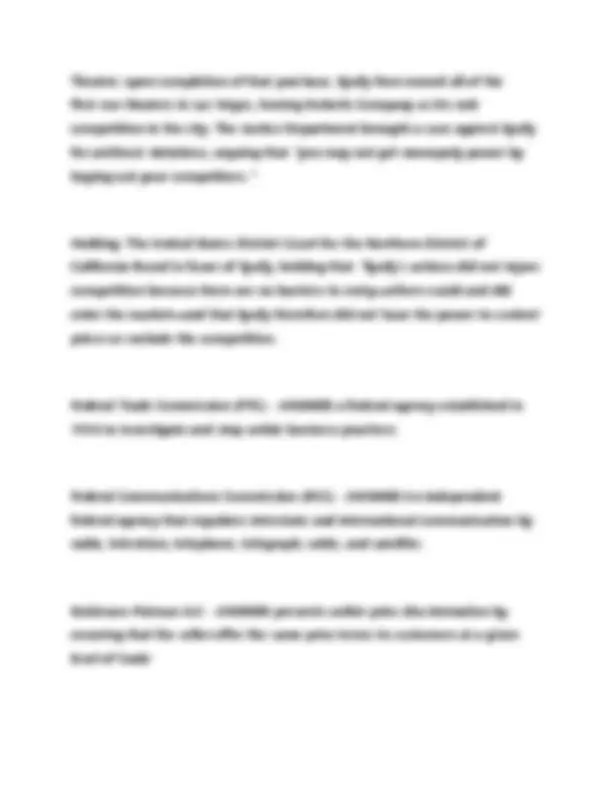
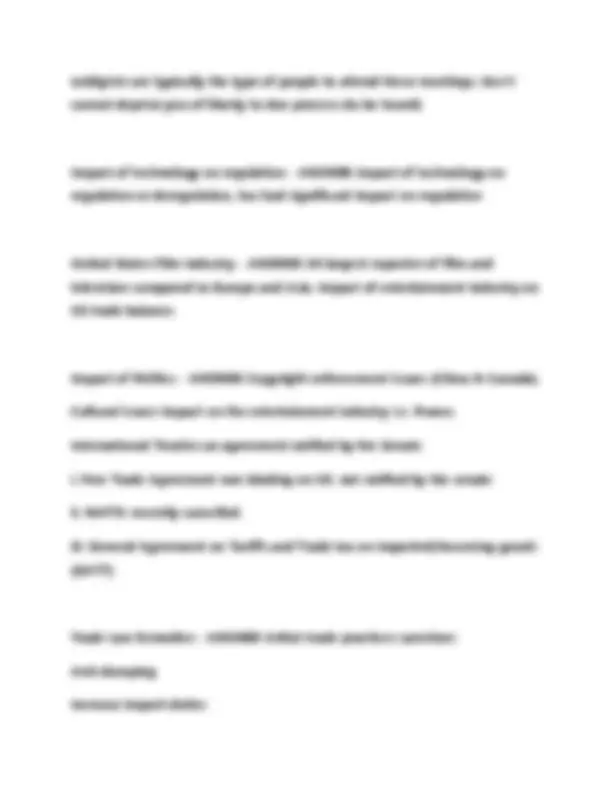



Study with the several resources on Docsity

Earn points by helping other students or get them with a premium plan


Prepare for your exams
Study with the several resources on Docsity

Earn points to download
Earn points by helping other students or get them with a premium plan
Community
Ask the community for help and clear up your study doubts
Discover the best universities in your country according to Docsity users
Free resources
Download our free guides on studying techniques, anxiety management strategies, and thesis advice from Docsity tutors
This document delves into the complexities of entertainment law, focusing on talent representation and the crucial aspects of fiduciary duty and conflict of interest. it examines key legal cases such as abkco music, inc. V. Harrisongs music, ltd., croce v. Kurnit, and wachs v. Curry, illustrating real-world scenarios of breach of fiduciary duty and conflict of interest in the entertainment industry. the document also explores the roles of talent agents, personal managers, lawyers, and entertainment labor unions, providing insights into their functions and legal responsibilities. furthermore, it discusses antitrust laws and their implications for the entertainment industry, including the analysis of ascap and bmi as potential monopolies. valuable for students studying entertainment law, business law, or related fields.
Typology: Exams
1 / 14

This page cannot be seen from the preview
Don't miss anything!









Talent agent - ANSWER An individual who represents creative personnel (such as actors, directors, authors, and screenwriters) and aims to find roles for payment
Talent agent license - ANSWER requires a license in order to demonstrate to the public that they are qualified; two types of licenses
Purpose of license - ANSWER License is used to protect the public
Fiduciary duty - ANSWER That duty owed by an agent to act in the highest good faith toward the principal and not to obtain any advantage over the latter by the slightest misrepresentation, concealment, duress or pressure; to be transparent
conflict of interest - ANSWER a situation in which an action by a company or individual results in an unfair benefit
"Chinese wall" - ANSWER Imaginary barrier restricting the flow of information between the Public side of the business (e.g. Sales and Trading) and the Private side (e.g. Investment Banking); keeps everything separate to prevent conflict of interest
Abkco Music, Inc. v. Harrisongs Music, Ltd. - ANSWER Facts: Klein, acting as BM for Harrison and Beatles, advises Harrison to buy Bright Tunes (who is suing Harrison), but during deal, Klein quits and gets ABKCO to counter-bid for Bright Tunes, providing them with confidential information of how much
Harrison's song is worth. Harrison, managed by ABKCO Music (Klein), was sued by the copyright holder of the hit song "He's So Fine," Bright Tunes, who claimed Harrison's song "My Sweet Lord" infringed on their copyright. Klein tried unsuccessfully to settle the suit, then his K with Harrison expired. After agency termination, Klein used Harrison's confidential info in negotiations to purchase Bright Tunes; this action prolonged litigation. By purchasing Bright Tunes and all the rights to the infringement suit, ABKCO/Klein became the plaintiff in the trial against Harrison for damages. At trial, Harrison counterclaimed for damages from ABKCO's breach of the duty of fiduciary duty.
Holding: The court held Klein/ABKCO in breach of its fiduciary duty to Harrison. Even though Klein was no longer Harrison's BM, he still had a fiduciary duty not to pass confidential information obtained during rep. Since he gave Bright Tunes confidential earning schedules (that were not publicly available) belonging to Harrison, and Klein's former position aided in his purchase of BT, his conduct did not meet the standard of former fiduciary.
Rule: A business agent has a fiduciary duty not to use confidential knowledge acquired in employment to compete with principal, and duty persists even after expiration or termination of employment agreement.
Croce v. Kurnit - ANSWER Facts: Kurnit was an attorney, though not Croce's, who had a business relationship with the publishers and managers of Croce. The record company entered three contracts with Jim Croce as PMs, recording company, and assignees of copyrights, and Kurnit failed to inform Croce to seek independent counsel. Croce's widow sued for breach of fiduciary duty.
Holding: Court upheld contracts, finding them not voidable despite obvious
career.
Lawyer - ANSWER involved in contracts and negotiations. Will sometimes combine services for both sides
Entertainment labor unions - ANSWER Studio control over labor (long-term employment contracts), Various union organizations and purpose
Union accomplishments (working conditions, wage, residuals, disputes, artistic credit)
National Labor Relations Act - ANSWER A 1935 law, also known as the Wagner Act, that guarantees workers the right of collective bargaining sets down rules to protect unions and organizers, and created the National Labor Relations Board to regulate labor-managment relations.
Union - ANSWER A worker association that bargains with employers over wages, benefits, and working conditions
Labor Solidarity - ANSWER Contract relationship between studio and union (not with employees), Obligation to bargain in good faith - no obligation to agree, Strike - crossing picket lines
Management is excluded from NLRB protection
anti-trust laws - ANSWER Prohibit monopolies & contracts, combinations & conspiracies that unreasonably restrain trade.
Sherman Antitrust Act - ANSWER an 1890 law that banned the formation of trusts and monopolies in the United States
ASCAP and BMI - ANSWER American Society of Composers, Authors and Publishers, Broadcast Music, Inc. considered monopoly; receive licenses from owner of the music and in turn license music worldwide to anyone who want to use it. Owner cannot license their own music.
Rule of reason - ANSWER before ruling on the legality of certain business practices, a court examines why they were undertaken and what effect they have on market competition; While ASCAP and BMI are considered a monopoly there is no other alternative for what they do, as such it makes sense (rule of reason) to leave them alone
Employee or Independent Contractor - ANSWER Employment protection applies to employee, not independent contractors. Difficult to determine; producer/director, director/actor, packager/producer
Performer "loan out" company - ANSWER corporation used to finance
other needs demand other procedures. On this record, and based upon the issues properly before us for decision, we cannot say that the procedures designed for speed overwhelmed the ideal of justice. Marino loses
HBO v Directors Guild of America - ANSWER ;Facts: Guild has bargained for and signed certain standardized agreements, with companies that produce programs for pay television ("signatories"), that specify the terms on which directors may provide their services.HBO contends that certain Guild membersfreelance directors, producer-directors, and director-packagers are independent contractors or entrepreneurs and therefore may not lawfully combine to restrain the sale of their services.Guild contends in response that its actions and agreements are exempt from the antitrust laws. The Guild argues that its combinations with freelance directors, individually or through loan-out companies, with producer-directors, and with director-packagers are protected by the "statutory" exemption afforded unilateral labor activity.
Holding: HBO needs to honor union rules for directors who work under them, even if they are free-lance, independent, or have multiple titles.
Monopoly - ANSWER concentration of economic power that tends to unreasonably restrain competition; one major owner of the market
Clayton Antitrust Act - ANSWER prevents conspiracies to restrain trade
director of packager - ANSWER someone who has their own money and can control. They buy programs and can even produce them themselves. They have control and risk = management. Put the deals on programming together and sell it. They are management not labor. Do not have to follow union rules
History of Labor Unions - ANSWER began late 20's and early 30's: used to be really violent
studio control over labor (long term employment contracts)
various unions and purposes
federal not state
performer ability to negotiate own contract
hollywood was most unionized industry
represents members/workers not management
labor unions set the minimum
United States v Paramount Pictures - ANSWER Facts: The major film studios owned the theaters where their motion pictures were shown, either in partnerships or outright. Thus specific theater chains showed only the films produced by the studio that owned them. The studios created the films, had the writers, directors, producers and actors on staff (under contract), owned the film processing and laboratories, created the prints and distributed them through the theaters that they owned: In other words, the studios were
Theatre; upon completion of that purchase, Syufy then owned all of the first-run theaters in Las Vegas, leaving Roberts Company as his sole competition in the city. The Justice Department brought a case against Syufy for antitrust violations, arguing that "you may not get monopoly power by buying out your competitors."
Holding: The United States District Court for the Northern District of California found in favor of Syufy, holding that "Syufy's actions did not injure competition because there are no barriers to entry—others could and did enter the market—and that Syufy therefore did not have the power to control prices or exclude the competition.
Federal Trade Commission (FTC) - ANSWER a federal agency established in 1914 to investigate and stop unfair business practices
Federal Communications Commission (FCC) - ANSWER An independent federal agency that regulates interstate and international communication by radio, television, telephone, telegraph, cable, and satellite.
Robinson-Patman Act - ANSWER prevents unfair price discrimination by ensuring that the seller offer the same price terms to customers at a given level of trade
Horizontal Integration - ANSWER Type of monopoly where a company buys out all of its competition. Ex. Rockefeller
Vertical Integration - ANSWER Practice where a single entity controls the entire process of a product, from the raw materials to distribution
Remedies for violating anti-trust law - ANSWER Divestiture
Injunction
Fines - Jail
Consent Agreement
regulatory agency - ANSWER a department, bureau, or independent agency whose primary mission is to impose limits, restrictions, or other obligations on the conduct of individuals or companies in the private sector
Regulators - ANSWER new regulations deprive us of our liberties (due process--the part where they develop rules and publish it in the Federal Publisher)
FCC rules - ANSWER a government agency that creates regulations
FCC has rules about financial interest and syndication rights of television networks in programming they broadcast. Big networks were taking
Lobbyists are typically the type of people to attend these meetings. Gov't cannot deprive you of liberty to due process (to be heard)
Impact of technology on regulation - ANSWER impact of technology on regulation or deregulation, has had significant impact on regulation
United States Film Industry - ANSWER US largest exporter of film and television compared to Europe and Asia. Impact of entertainment industry on US trade balance.
Impact of Politics - ANSWER Copyright enforcement issues (China & Canada).
Cultural issues impact on the entertainment industry i.e. France.
International Treaties an agreement ratified by the Senate
i. Free Trade Agreement non binding on US. not ratified by the senate
ii. NAFTA recently cancelled.
iii. General Agreement on Tariffs and Trade tax on imported/incoming goods (GATT)
Trade Law Remedies - ANSWER Unfair trade practices sanctions
Anti-dumping
Increase import duties
Dumping - ANSWER unfair trade practice whereby manufacturers in foreign company will sell to US and charge higher price than it cost to make because they know domestic market can't compete
World court - ANSWER Non-compliant countries pressured to comply with trade rules